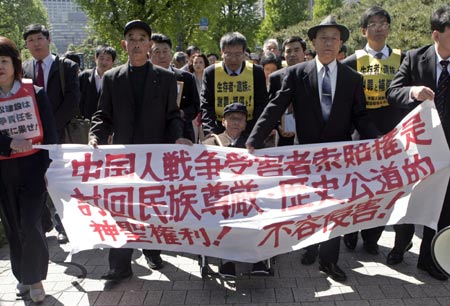Japan courts reject WW2 suits
(Reuters)Updated: 2007-04-27 10:04
TOKYO - Japan's top court on Friday rejected two compensation claims by Chinese who suffered at Japanese hands during World War Two, as Prime Minister Shinzo Abe tried to soothe anger in Washington over his comments on wartime sex slavery.
 Shao Yicheng (3rd R), a former slave labourer, and other plaintiffs enter the Supreme Court in Tokyo April 27, 2007. Chinese slave labourers who were forced to work in Japan during World War Two lost their bid for compensation on Friday when the Supreme Court overturned a landmark ruling that had ordered a Japanese company to pay them. The banner reads, "Demand respect and justice for slave labourers". [Reuters] |
Two Chinese women who were kidnapped and forced to provide sex for Japanese soldiers during World War Two lost their Supreme Court appeal for damages. That claim had already been settled under a 1972 Japan-China joint statement, the court said.
Their lawyer called on the government nonetheless to provide some form of damages to the surviving of the two women, who is 80 years old.
"I hope that the government admits to the truth and takes specific measures
to compensate the victim while she is in good health," said lawyer Sadahiko
Sakaguchi.
In another case, five Chinese who were forced to work for
Japanese firm Nishimatsu Construction Co. Ltd. during World War Two lost their
fight for compensation when the Supreme Court overturned a landmark ruling that
had ordered the company to pay them.
That claim had also been settled under the 1972 joint statement, the court said.
"The ruling is disgraceful in light of friendly relations between Japan and
China," said Shinzo Tsuchiya, a supporter of the former labourers.
| 1 | 2 |  |
|
||
|
||
|
|
